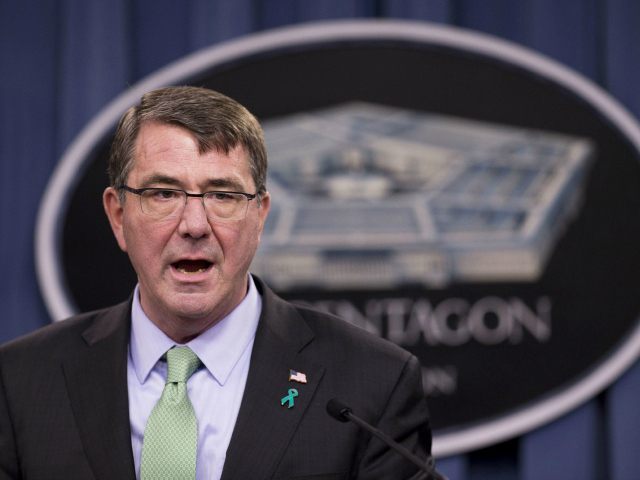WASHINGTON, D.C. — The Pentagon will request $7.5 billion to fund America’s war against the Islamic State (ISIS/ISIL) in 2017, marking a 50 percent increase in spending on the conflict this year, revealed Secretary of Defense Ash Carter.
Citing anonymous U.S. officials, Reuters anticipated that the Obama administration is expected to “seek a significant increase in funding for the fight against Islamic State as part of its 2017 defense budget request … in another possible sign of U.S. efforts to intensify the campaign.”
Carter’s revelation came Tuesday morning while he addressed the Economic Club of Washington.
Carter said the Pentagon is seeking the $7.5 billion to address the changing strategic environment linked to the war against ISIS.
“He said the increase was critical because the United States has used so many smart bombs and laser-guided rockets against the militants in Iraq and Syria that it is running low on the weapons and needs to invest $1.8 billion for 45,000 more,” reports Reuters.
Overall, the Pentagon is expected to request a $582.7 billion defense budget for 2017.
The Department of Defense (DOD) will “reshape its spending priorities to reflect a new strategic environment marked by Russian assertiveness and the rise of Islamic State,” indicated Carter, according to Reuters.
Carter noted the Pentagon’s planning is being driven by five big evolving challenges facing the U.S. military: Russia, China, North Korea, Iran, and ISIS.
“Today’s security environment is dramatically different than the one we’ve been engaged with for the last 25 years and it requires new ways of thinking and new ways of acting,” he said.
The budget is expected to be released next week as part of the Obama administration’s fiscal 2017 budget request, points out The Wall Street Journal (WSJ).
“In this budget we’re taking the long view,” the Pentagon chief said. “We have to. Even as we fight today’s fights, we must also be prepared for the fights that might come 10, 20 or 30 years down the road.”
DOD has to cut projected spending by nearly $1 trillion over a decade, but the congressional 2015 budget deal increased the Pentagon’s spending caps by $25 billion this year and $15 billion for 2017.
This fiscal year, DOD received $580 billion, including a $521 billion base budget and $59 billion in war funding, which is not restricted by budget caps.
“The budget deal set the Pentagon’s base budget for 2017 at about $524 billion and war funding at a minimum of $59 billion,” Reuters reports.
A top Republican in the House was quick to accuse President Obama of failing to use the authority granted to him by the deal to increase the Pentagon’s war funding budget. “The president’s response to a security environment that is quickly degrading is to further cannibalize our military capability,” Rep. Mac Thornberry, the chairman of the House of Representatives Armed Services Committee, said in a statement.
The Pentagon will ask for $3.4 billion to boost military training in exercises, a move aimed at reassuring European countries concerned with Russian aggression.
In a statement, President Obama said the request for European training, which marks a four-fold increase from last year’s $789 million, would allow America to strengthen the U.S. military posture in Europe.
DOD also plans to invest $71.4 billion next year in research and development in an effort to build upon the U.S. military’s technological superiority, revealed Carter, noting that much of the funds will be focused on boosting strategic capabilities.
The defense secretary voiced concern about China’s military intentions. “Beijing has been rapidly developing missiles and other weapons that could force the U.S. military to operate farther from shore in the case of a conflict,” notes Reuters.
“Key to our approach is being able to deter our most advanced competitors,” said Carter. “We must have–and be seen to have–the ability to impose unacceptable costs on an advanced aggressor.”
The Pentagon will also devote $8.1 billion on undersea warfare capabilities in fiscal 2017 and more than $40 billion over the next five years, according to the defense secretary.

COMMENTS
Please let us know if you're having issues with commenting.